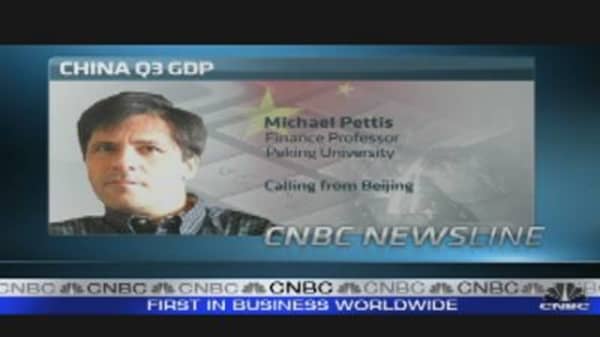Disappointing Chinese GDP (gross domestic product) figures for the third quarter come amid increasing worries about inflation and local government debt in the economic powerhouse.
Markets in Europe were set to open lower Tuesday morning after government data showedthe Chinese economy grew at its slowest rate for two years in the third quarter of 2011.
There are increasing worries about inflation in the country.
Michael Pettis, Finance Professor at Peking University told CNBC Tuesday that he believes inflation will "gradually work its way down" as food prices drop.
"The government is very worried about inflationary pressures because of the social impact, but there are not a whole lot of tools available to them," he said.
"There has really been some serious attempts to slow credit growth, which is still extremely high, and from an incredibly high base."
The Shanghai Composite and the Hang Seng indices both fell on Tuesday after it emerged that the Chinese economy grew by 9.1 percent in the three months between July and September, less than the expected 9.2 percent and than the previous quarter's 9.5 percent growth.
The Chinese central bank has hiked interest rates, a time-honored way of attempting to control inflation, five times in the past year.
However, Pettis pointed out that real interest rates had not gone up, as the rise in interest rates had been outstripped by increases in inflation. Chinese households tend to save more and keep their savings in bank deposits, which will rise in value as interest rates go up, according to Pettis.
"The wealth effect of interest rates in China is very different to the US," he said.
"Rising interest rates actually make Chinese households feel richer instead of poorer, so it increases consumption."
Worries about the euro zone crisis leading to a slowdown in Chinese exports have hampered the Chinese markets.
There has even been speculation that China and the other Brics countries EXPLAINS may have to help bail out the euro region, although Pettis dismissed this as "absurd."
"The one thing China fears is a euro zone that survives with a weak euro and Germany as an industrial powerhouse," George Godber, fund manager at Matterley Asset Management, told CNBC Tuesday.
"A 30 percent drop in the value of the euro would not be appreciated in Beijing."
He believes that Chinese companies are trying to "emulate German engineering" above all else.
Recent spikes in Chinese CDS spreads, which have almost doubled in the past six months to close at 145 yesterday, show that traders are worried about the Chinese economy, according to Godber, who called current levels "extraordinary."
"One of the big areas of concentration is the debt situation, not necessarily at the top of government but that the individual local authorities may have over-extended themselves or over-borrowed," he said.





